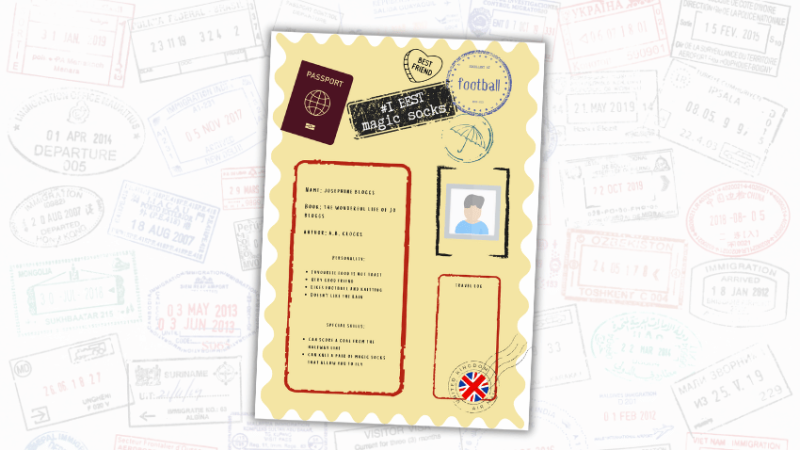Phonics games – Fun online and offline ideas for EYFS and KS1
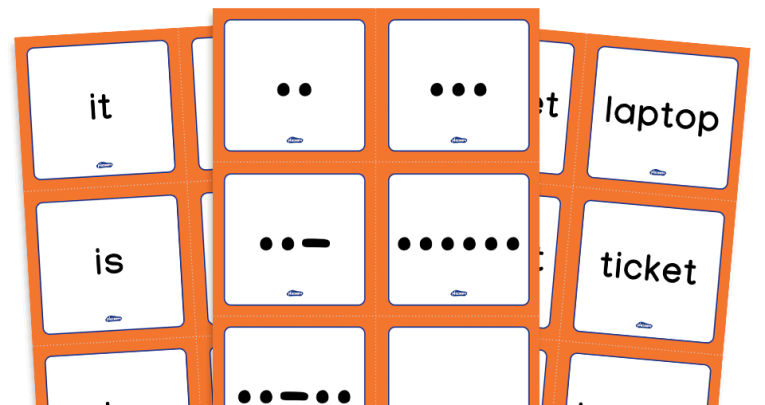
Boost reading and spelling skills with these games, activities, ideas and more for EYFS and KS1…

- by Teachwire
- Classroom expertise and free resources for teachers
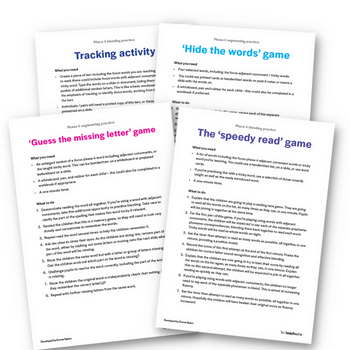
With phonics, it can be very easy to slip into a dull routine because you’re covering the same subject every day. However, if you have fun and enjoy exploring words and spellings, you can’t help passing on that enthusiasm to the children you teach. Here we set out the best phonics games ideas to explore with EYFS and KS1…
Offline phonics games
Phase 4 phonics games

Use these phase 4 phonics games to help your pupils master blending and segmenting words. The full instructions are in the free download and include the following four games:
- Speedy read
- Tracking activity
- Hide the words
- Guess the missing letter
Dots and dashes spelling games
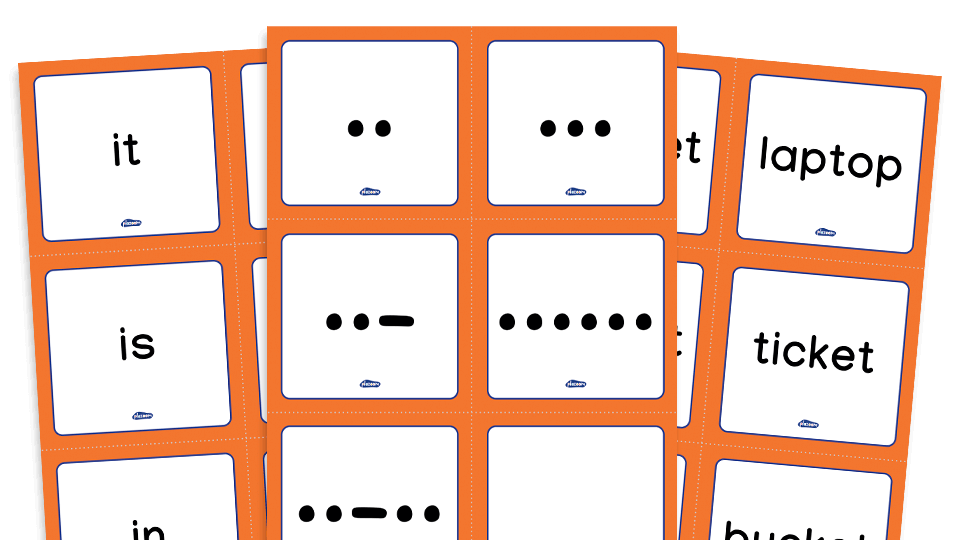
These phonics games for Year 1 from literacy resources website Plazoom will develop pupils’ segmenting skills. They’ll practise identifying the phonemes (sounds) in words and choosing the correct graphemes (letters) that represent these.
To play, they must find words that match the dots and dashes cards. Their knowledge of sound buttons will help them with this task. A variety of dots and dashes and word cards with are included in each.
Click the links to check out each phase’s game:
You can also check out our worksheets for Phase 5 phonics.
Gameshow activities

With a touch of game show theatre and very little effort, your phonics sessions can become a high point of the day. Try these phonics games from Jacqueline Harris…
Who Wants to be a Millionaire?
Who Wants to be a Millionaire? is a very simple quiz format that is easy to turn into a phonics game. There’s no need to do 15 questions, five will fit nicely into the practise part of the phonics lesson.
You can, if you want, do the questions as multiple choice, depending on the class; multiple choice is easier.
Start with easy questions and ask the children to work in pairs to come up with the answers. I tend not to make children officially ‘out’, as then they would not be taking part. Add in ‘phoneme a friend’ for asking for support.
So, your quiz could look like this:
Example for Phase 5
- For £100, spell the word ‘tin’
- For £1,000, spell the word ‘remind’
- For £10,000, spell ‘child’ and ‘children’
- For £50,000, give two or more alternative spellings / words with long /i/ sound (eg pie, mine)
- For £1,000,000, what does ‘grind’ mean? (Hold up the word but don’t say it)
Alternatively, the £1,000,000 question could be a mini dictation for the ‘apply’ section of the lesson.
Children love getting £1,000,000 and plan all sorts of ways to spend it – even though they know it is not real.
Blankety Blank
Blankety Blank asks that children use comprehension as well as spelling. You give a word and the children need to come up with another word that goes with it, so ‘ice’ could become ‘ice cream’ or ‘ice cold’, etc.
You give one point for the correct spelling of the keyword, which will be a grapheme from that week, and then an extra point if the second word is also correct.
If you are feeling generous, a third point can be awarded if they have more than one suggestion.
The children can work in pairs or small groups to complete the tasks; those with good comprehension but possibly poor spelling can shine with this game if well paired with other children.
Example for Phase 4
- Lamp – lamp post or headlamp
- Step – doorstep, footstep
- Stand – handstand, headstand, bookstand, coat stand
- Brush – hairbrush, nailbrush, paintbrush
- Lunch – lunchbox, lunchtime.
You may need to give lots of clues when you first play this game, but children get better at thinking about words with practise such as this.
The Generation Game
This involves memory as well as spelling ability and is a lot of fun. Pick four or five objects with names that include the grapheme you are working on.
Make a tray with the objects and give children a short time to look at and remember them. Then cover the tray up and ask children to write down, spelling correctly, the objects.
Example for Phase 3
- A tray with a ship, a shop (picture), a shell and a fish
- A challenge for the more able might be the addition of a brush and a shirt
Jacqueline Harris is a literacy consultant and passionate advocate of high-quality children’s literature. Follow her on X at @Phonicsandbooks.
Make phonics sunflowers
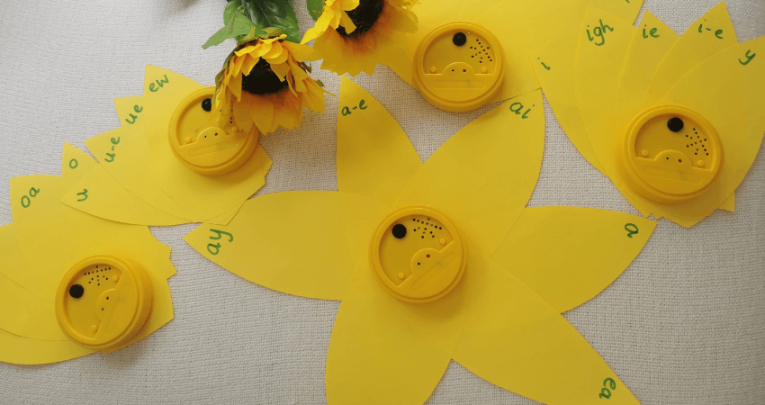
Introduce the concept of alternative graphemes (one sound that can be written in different ways) in KS1 with this listening experience…
Step 1
Start with noting down the alternative graphemes for the long vowel sounds (phonemes) – a (ai), e (ee), i (igh), o (oa), u (y+oo).
Say each vowel out loud for the class and ask them to repeat it. Next, get them to write down some alternative spellings for each sound (e.g. for ‘e’, they could write ee, ea, e-e, ie, y, etc). You can model this on the board, or get them to write the spellings out in their books.
By starting with these sounds, you are enabling the children to understand the concept of alternative graphemes, which will then help them make connections to further spelling patterns, rules and homophones.
Step 2
Now that you have a list of alternative graphemes associated with each vowel sound, explain to pupils that they are going to work together to make ‘sound sunflowers’.
First, give each pupil one vowel sound to concentrate on – depending on how many pupils you have, there should be a few children working on each sound. This will be useful for group work, later.
Explain that they’ll be recording their chosen sound on a talking tin, which will act as the centre of their sunflower (I used talking tins that record for 10 seconds).
It’s best to model this part to show children how to record their sounds – the tins should come with instructions if you haven’t used them before.
Step 3
Once pupils have recorded their vowel sounds, it’s time to make the sunflower petals. Each flower should have enough petals for the alternative graphemes children have written down for their vowel sound (usually around six is sufficient).
You could either cut out the petals in advance, or ask children to do it themselves, depending on your class. Use yellow card so they don’t bend too much under the weight of the talking tins.
Once all the petals are cut out, overlap one end of each petal in a circular design until you have a flower shape. Glue or pin in place, and attach the talking tin to the centre.
Step 4
Now it’s time to add the alternative graphemes you wrote down earlier in the lesson to the sunflower petals.
For a recall exercise, you can ask pupils to try and remember the different graphemes they came up with for their vowel sounds without looking at their lists. How many can they remember?
Get the children to write one alternative grapheme for their recorded vowel sound at the tip of each petal.
Step 5
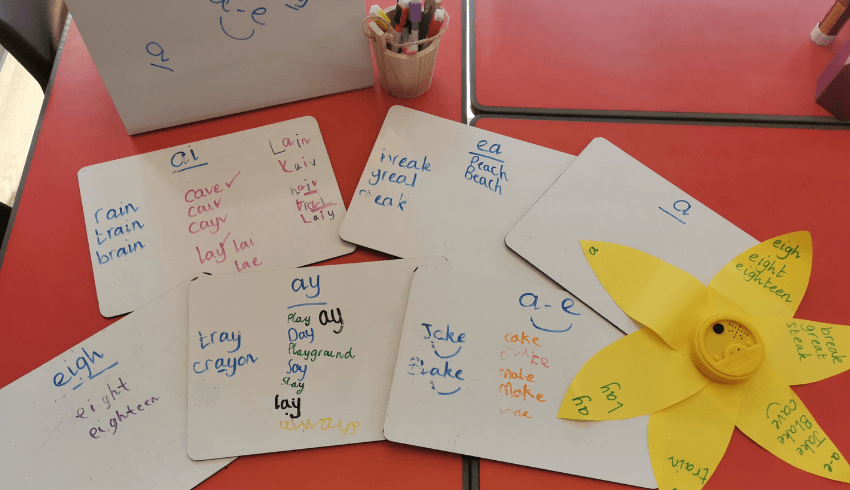
Finally, once the sunflowers have been populated with their alternative graphemes, ask children – either individually or in groups of vowel sounds – to think of as many words as they can that contain each alternative grapheme.
For example, pupils who have been working with i (igh), could write out sigh, sight, light and night on their ‘igh’ petal, and cry, why, try, my and by on their ‘y’ petal, etc.
After a few minutes, get the groups to rotate and swap sounds, adding any new words they can think of to the other sunflowers.
Kiran Sunray is a senior assistant principal, Year 2 teacher, and EYFS, KS1 and English lead. She is also a Primary Trust literacy lead practitioner.
Tap the sound, say the sound
Pop a flashcard featuring a particular sound on your classroom door that children have to say whenever they enter or exit the room.
Use new sounds, previously taught sounds or a sound the majority of pupils haven’t nailed, such as ‘igh’.
No preparation, no resource making, no marking – just a simple, low-stakes but incredibly effective way of reviewing previously taught sounds.
As children walk past, say ‘Tap the sound, say the sound’. This activity helps behaviour while your children are lining up. They are more focused on what sound they are going to be tapping and reading than making any poor behavioural choices.
Daily review strengthens neural connections over time. These are necessary for developing expertise, supporting retention in short-term and long-term memories.
For assessment purposes, this activity helps you identify which children may need a little extra support and/or intervention around a particular sound.
Jess Darby is a teacher, phonics lead and history lead in West Yorkshire. Follow her on Twitter @missdarby_
Ideas for EYFS

1. Buzzy bees
Make a list of sounds that link with an animal, vehicle or action when repeated. For example:
- zzz-zzz for buzzy bees
- sh-sh-sh for soothing a baby
- sss-sss for a hissing snake
- d-d-d for hammering
- u-u-u for tugging a heavy trolley
- a-a-a for ticking someone off
- rrr-rrr for a roaring motorbike
- ch-ch-ch for a chugging train
- ee-ee-ee for a mouse
Practise the sounds and explore ways of role playing the action, animal or vehicle. Encourage children to come up with their own ideas for actions. Can they think of any other scenarios to link with a particular sound?
2. Jolly jumps
Make up a selection of alliterative phrases that include a simple action. For example, “do a jolly jump”, “run round the rug”, “hop happily”, “sip steaming soup”.
Identify the alliterative initial sound (‘j’, ‘r’, ‘h’, ‘s’) and emphasise the sound as you say the phrase. Encourage children to repeat the phrase before carrying out the action.
Introduce alliterative phrases that include names of children in the group – “tickle Tara”, “hug Harry”, “tap Tomas” (first asking their permission!). Where necessary, choose action words that children can carry out themselves – “grumbling Gregor”, “rolling Rashid”, “stamping Stevie”.
3. The sound box
Fill an attractive lidded box with interesting items and pictures covering the sounds you wish to explore. Some possibilities include items with the same initial sound, a selection of items for sorting into separate sounds and picture cards for matching sounds (‘chair/cheese’).
Talk about the items, name them and identify their initial sounds before using them for ‘I Spy’, pairing and sorting activities.
With older children who are adept at identifying initial sounds, use carefully chosen items to introduce end sounds; for example, ‘pig’ ends with a ‘g’ sound. You can also add letter cards for children to match with the sounds.
4. Sandpit sounds
Bury a collection of items in the sandbox and challenge children to dig them up. Encourage children to explore the items, and during conversation identify each item’s initial sound.
Theme the items to fit in with a specific topic, or make a random collection. You can also focus on particular sounds and ask children to help you sort the items into sound groups.
Encourage older children to identify the sounds for themselves and find their own items to bury. Remember to identify the initial sound rather than letter – for example, ‘ship’ begins with the sound ‘sh’ rather than the letter ‘s’.
5. Tongue tasters
Gather a selection of foods beginning with sounds you want to explore. Name the foods and say, “I taste with my little tongue, something beginning with…”
Let the children taste the chosen food, and encourage them to repeat its name, emphasising the initial sound. Always check first for allergies, and never force an unwilling child to taste a food.
As the children become more able to identify initial sounds, follow the traditional ‘I spy’ format by increasing the number of foods to choose from.
6. Sound hunts
Hide items from the sound box in the setting and ask children to hunt for an item beginning with a given sound. Give them a clue by telling them which area to look in, for example, the cloakroom.
Once they have started to link sounds and letters, give them a letter card as a prompt. As they bring back items they have found, help them to put the items into sound pairs or sort into sound groups.
If necessary, ask other adults in the setting to accompany children and help them remember the sound they are hunting for.
Hilary White is a former nursery and primary teacher.
Noisy letter jump phonics game
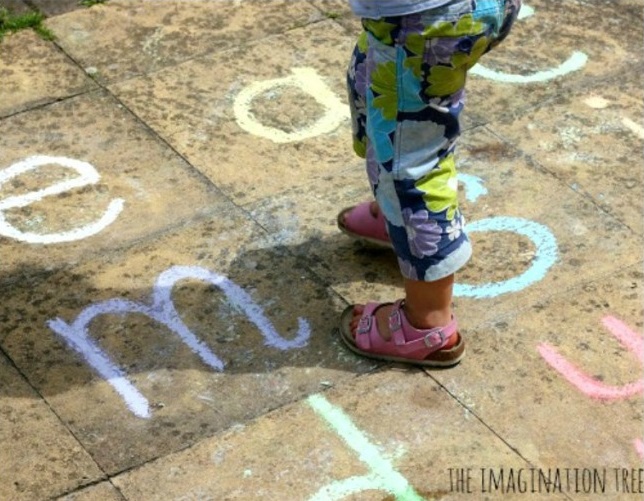
You’ll probably have kids hooked on this idea at the word ‘noisy’, but ‘jump’ and ‘game’ will also do its popularity no harm.
It’s extremely simple to create, requiring just some playground chalk and the ground, yet it’s a great way to consolidate phoneme-grapheme correspondence in an active way.
It’s also a great assessment tool to quickly see which letters children are less secure on. Read the full instructions for this noisy letter jump phonics game.
Boggle bulletin board
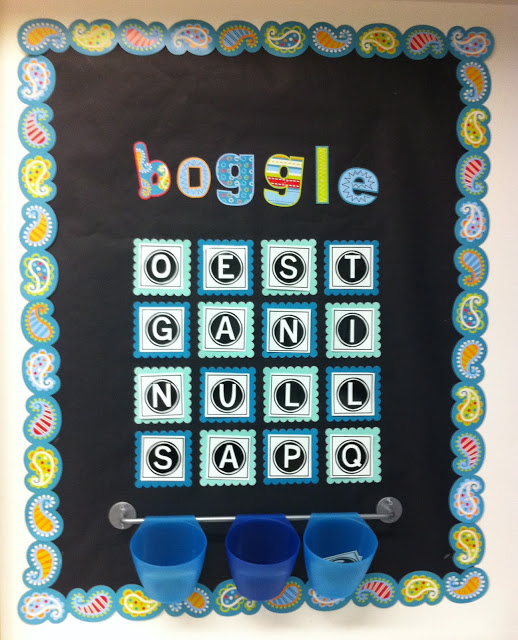
This fun Boggle board involves printable letters that can be changed however often you like, and comes with a worksheet each time for students to find as many words as they can. It’s an ingenious idea that can be used year-round for a quick and easy activity.
Dig and plant word-sorting game
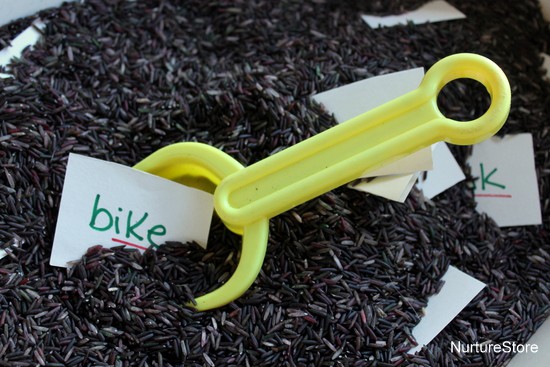
This sorting game uses a tub of dyed rice (or whatever mud substitute you prefer) in which you can hide a set of word cards. These can be tailored to whatever sounds you’re currently working on, or adapted to the needs of each child.
So you might sort upper- and lower-case letters, or words beginning or ending with particular letters or sounds.
The idea of the game is to go digging, pull up a word, and plant it in the right plant pot. It’s a fun, hands-on activity that lets your child enjoy some spelling practice.
Water balloons
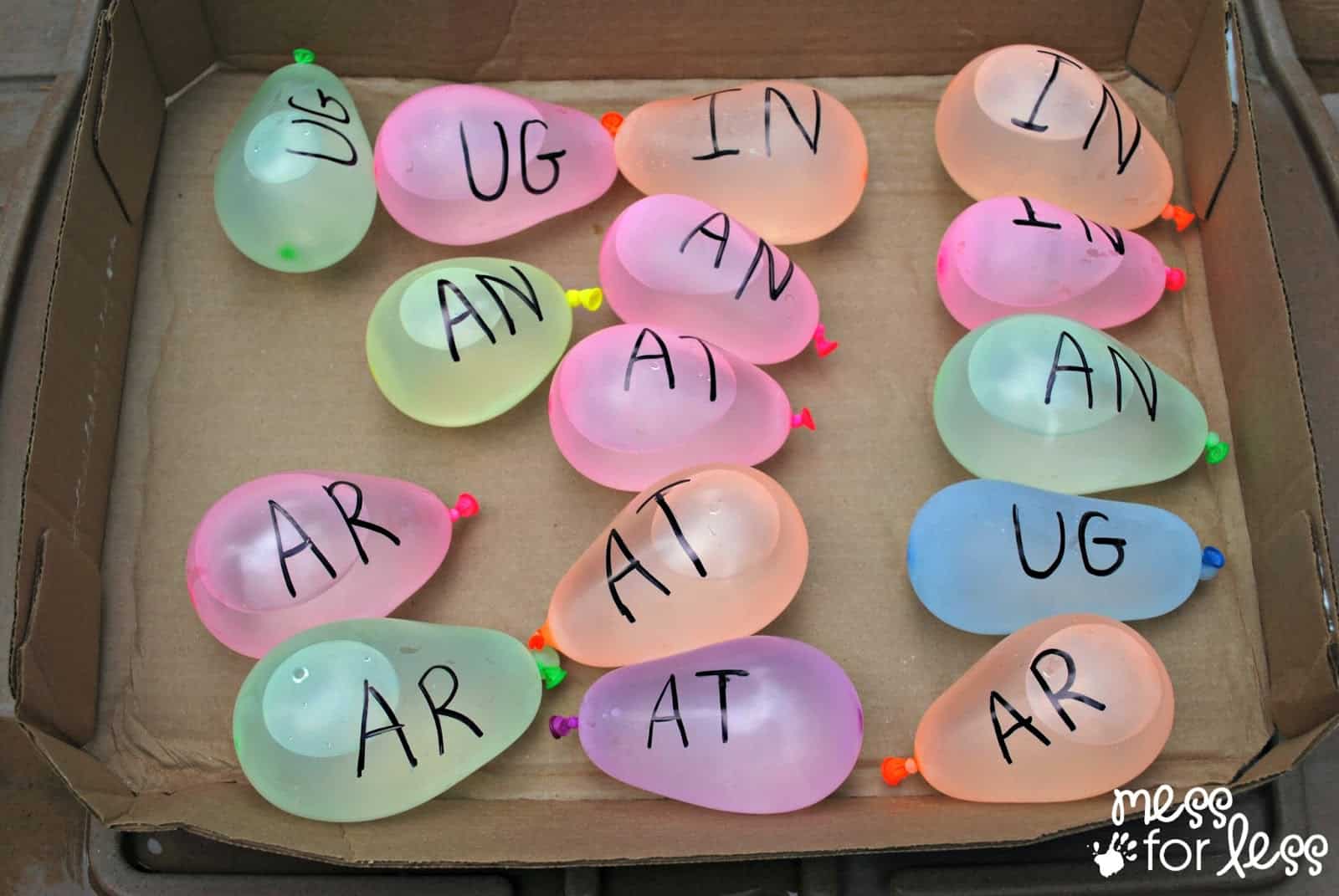
This phonics activity involves taping letters on index cards against a wall or fence, then filling some water balloons which have word endings written on them.
The children then pick a water balloon and hold it up against one of the index cards to see if the letter and word ending match to make a word.
If it does, they have to read the word out loud, and then they get to throw the balloon at the letter to pop it.
Practical phonics activities
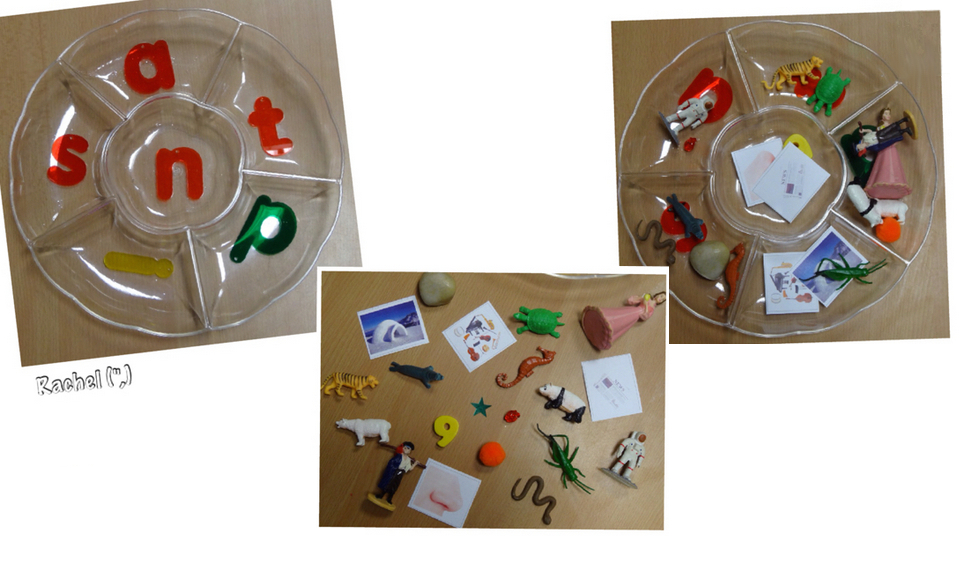
This matching initial sounds activity involves placing an object (or picture) into the correct spot according to its initial sound. Easy to set up, fun to do. It’s a win-win.
Online phonics games
Teach Your Monster to Read
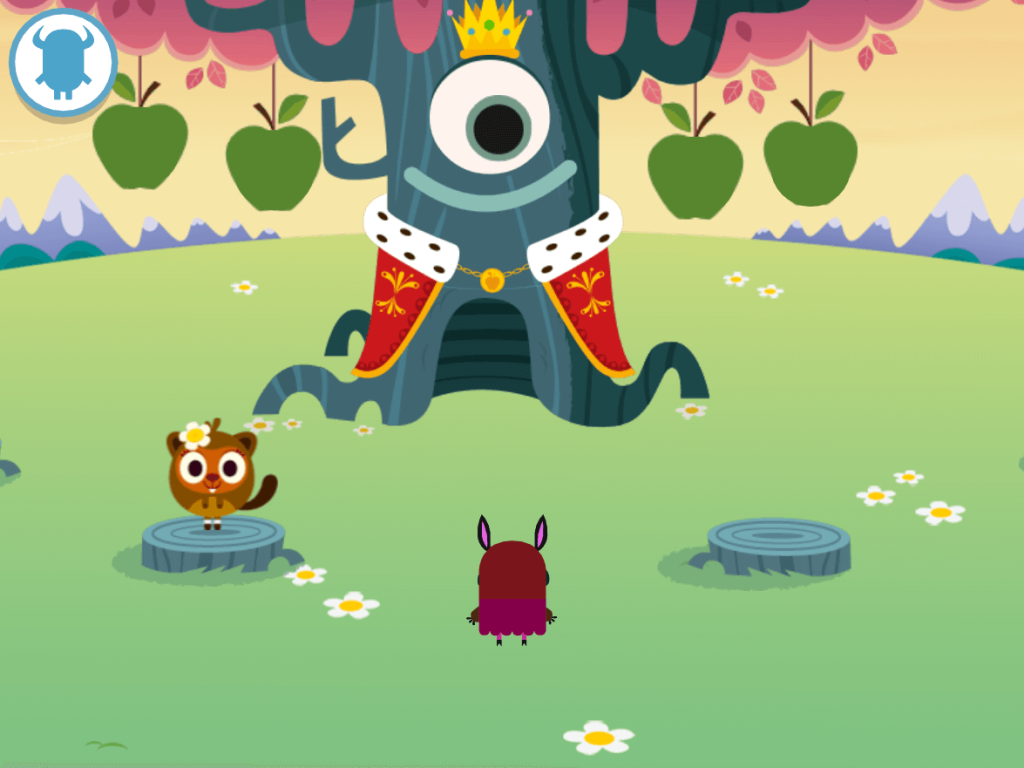
This award-winning game makes learning to read fun, and is aimed at children in the first stages of learning to read, or for older children who need a bit more practice.
It covers everything from letters and sounds to reading full sentences and complements all synthetic phonics programmes used in schools.
Phonics Bloom
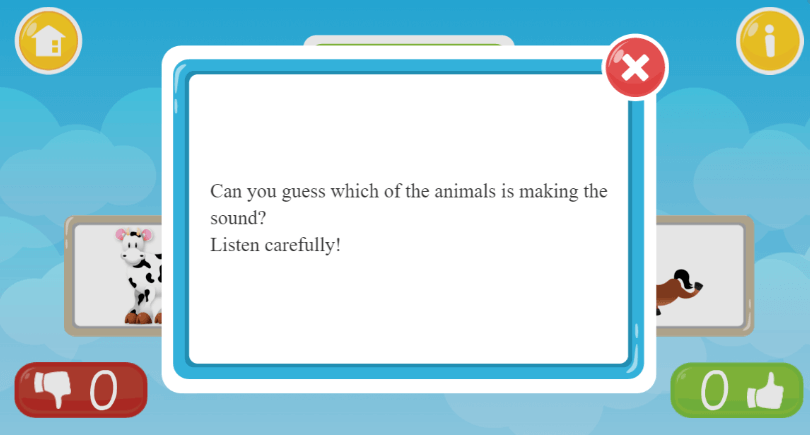
Phonics Bloom has a selection of phonics games organised by Phase. Some require a subscription, but many are free to play without even needing to sign up.
Dragon’s Den
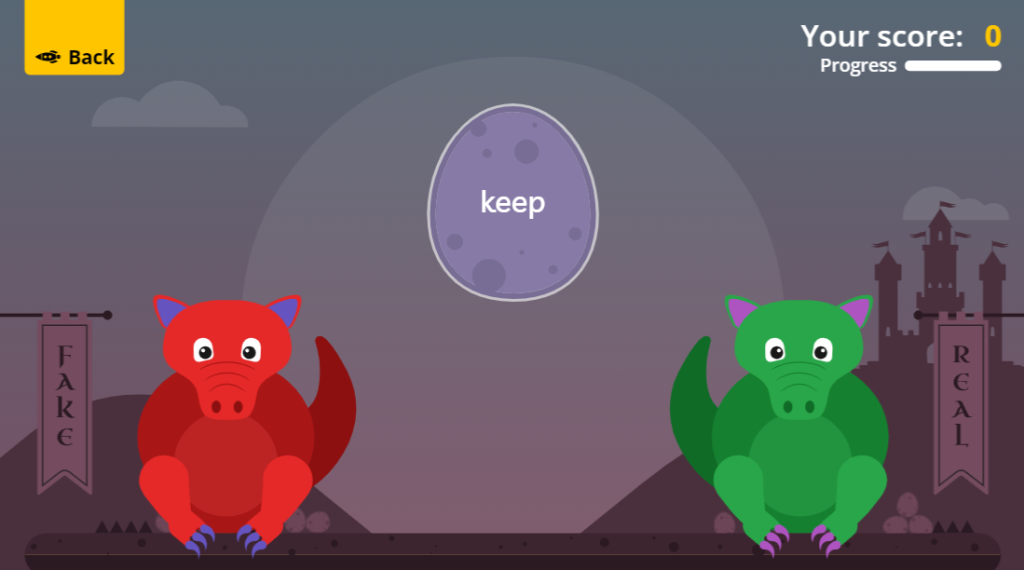
These two dragons have got their eggs mixed up. Drag each egg to the right dragon – green if it’s a real word or red if it’s a made-up word. Choose from Phases 2-5 and select specific sets to work on before you begin.
Help a hedgehog
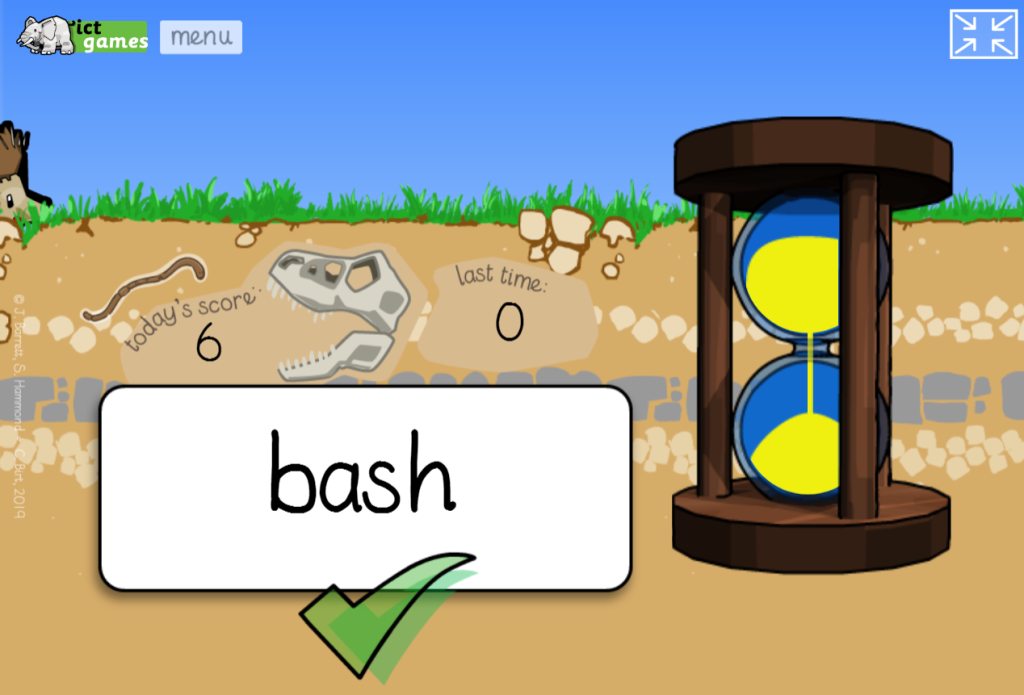
In this quick-fire decoding and blending game you can either enter your own words or use a pre-made set. Sit children in a circle and call one child out at a time to read the next word. Can you beat last lesson’s score in just 90 seconds?
Browse more ideas for spelling games.









